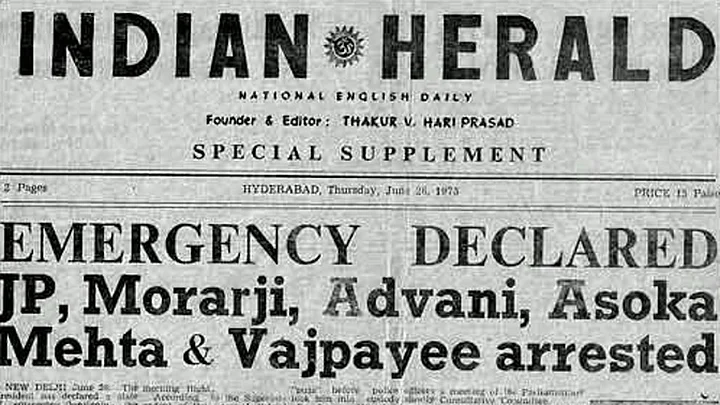When Emergency was declared in 1975 for a period of 21 months, each and every resource and force of the government was pressed into action to ensure its imposition. Except, the armed forces.
JP, the prolific leader who mobilised public opinion against Prime Minister Indira Gandhi at the time had, at a huge rally at Delhi’s Ramlila Maidan appealed “to the army, the police and the bureaucracy ‘not to obey Indira but abide by the Constitution’,” as recalled by veteran journalist Inder Malhotra.
Indira Gandhi reportedly used this call for institutional disobedience as one of the reasons to impose the Emergency. The claim was later proved to be false when, her then Joint Secretary, Bishan Tandon revealed that the preparations preceded JP’s appeal.
The Chief of Army Staff at the time, Gen TN Raina, shared a good equation with Indira Gandhi owing to their common Kashmiri origins, says military historian Maj Gen Ashok Mehta (Retd.). But that did not help Gandhi much.
During the Emergency, competing election rallies demanded resources and crowds. Defence Minister Bansi Lal wanted the Army to provide water trucks, with its military symbols removed, and soldiers, in civilian clothes, for water duties at India Gate for a mammoth Congress rally. Gen Raina, of course, refused to oblige.
—Maj Gen Ashok Mehta (Retd.)
Gen Raina was also asked to assist in the imposition of the Emergency according to Militarism in India, a book authored by Apurba Kundu, but he reportedly refused to have any part to play in it.
“You are not a part of the Emergency and keep away from politics,” was the instruction given by Gen Raina to all ranks according to para-trooper and veteran of two wars, Maj Gen Afsir Karim (Retd.), who was serving in the Army Headquarters at the time. He was close to the Army Chief and was in a role that involved daily official dealings with the Chief’s office.
There was a good equation between Raina and Indira since they were both Kashmiri pandits, but the Army remained absolutely apolitical and did not take any sides. There was an environment of suspicion in the headquarter. There was conscious attempt made not to speak against the PM, but no untoward incident ever took place.
—Maj. Gen. Afsir Karim (Retd.)
“We didn’t even feel that Emergency was implemented,” says former Army Chief Gen Shankar Roy Chowdhury (Retd.).
The army did what it was supposed to do and performed their regular duties along the borders. My jawans knew about the Emergency from the newspapers but other than that we had no instructions or participation.
—Gen Shankar Roy Chowdhury (Retd.), former COAS
Brig Gurmeet Kanwal (Retd.), a military analyst, was three years into service when the Emergency was declared.
It was good the army was not involved in upholding a patently illegal proclamation. That is the way it should remain. It will earn the army a lot of goodwill in the bargain.
—Brig Gurmeet Kanwal (Retd.)
He feels the army was able to earn goodwill and retain the respect earned over the decades and feels the army should continue to hold an apolitical status.
Indira Gandhi was labelled a “dictator” by the foreign press but unlike many other dictatorships in the third-world at the time, she did not get a chance to use the military for her means. And that, in the end, turned out well for the armed forces.
